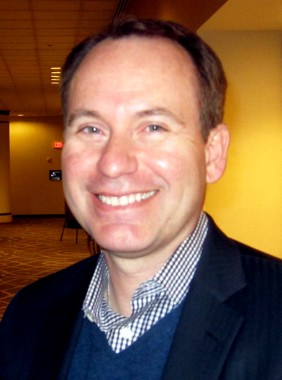User login
Is Bariatric Surgery the Right Treatment Model for Obesity?
WASHINGTON – Bariatric surgery has the greatest amount of data demonstrating its efficacy in reducing the comorbidities of obesity, as well as providing a long-term solution to the disease itself, according to Dr. John Morton, chief of bariatric surgery at Stanford (Calif.) University. Is it the model for obesity care that the nation needs to address the rising epidemic? If so, what stands in the way of its implementation? Dr. Morton offers a range of opinions in this audio interview.
WASHINGTON – Bariatric surgery has the greatest amount of data demonstrating its efficacy in reducing the comorbidities of obesity, as well as providing a long-term solution to the disease itself, according to Dr. John Morton, chief of bariatric surgery at Stanford (Calif.) University. Is it the model for obesity care that the nation needs to address the rising epidemic? If so, what stands in the way of its implementation? Dr. Morton offers a range of opinions in this audio interview.
WASHINGTON – Bariatric surgery has the greatest amount of data demonstrating its efficacy in reducing the comorbidities of obesity, as well as providing a long-term solution to the disease itself, according to Dr. John Morton, chief of bariatric surgery at Stanford (Calif.) University. Is it the model for obesity care that the nation needs to address the rising epidemic? If so, what stands in the way of its implementation? Dr. Morton offers a range of opinions in this audio interview.
EXPERT ANALYSIS FROM THE AACE/ACE CONSENSUS CONFERENCE ON OBESITY
Choice vs. regulation: the role of public policy in obesity management
WASHINGTON – It’s not people who’ve changed over the last 3 decades, but the environment around them that has brought on the obesity crisis, according to the deputy commissioner of the New York City Department of Health and Mental Hygiene, Dr. Susan M. Kansagra.
"The environment promotes people to consume more calories," Dr. Kansagra said in an audio interview during the American Association of Clinical Endocrinologists and American College of Endocrinology’s joint consensus conference on obesity. In this interview about the multifactorial nature of the disease, Dr. Kansagra discusses what role she sees as the role of public officials in shaping that environment.
WASHINGTON – It’s not people who’ve changed over the last 3 decades, but the environment around them that has brought on the obesity crisis, according to the deputy commissioner of the New York City Department of Health and Mental Hygiene, Dr. Susan M. Kansagra.
"The environment promotes people to consume more calories," Dr. Kansagra said in an audio interview during the American Association of Clinical Endocrinologists and American College of Endocrinology’s joint consensus conference on obesity. In this interview about the multifactorial nature of the disease, Dr. Kansagra discusses what role she sees as the role of public officials in shaping that environment.
WASHINGTON – It’s not people who’ve changed over the last 3 decades, but the environment around them that has brought on the obesity crisis, according to the deputy commissioner of the New York City Department of Health and Mental Hygiene, Dr. Susan M. Kansagra.
"The environment promotes people to consume more calories," Dr. Kansagra said in an audio interview during the American Association of Clinical Endocrinologists and American College of Endocrinology’s joint consensus conference on obesity. In this interview about the multifactorial nature of the disease, Dr. Kansagra discusses what role she sees as the role of public officials in shaping that environment.
EXPERT ANALYSIS FROM THE AACE/ACE CONSENSUS CONFERENCE ON OBESITY

